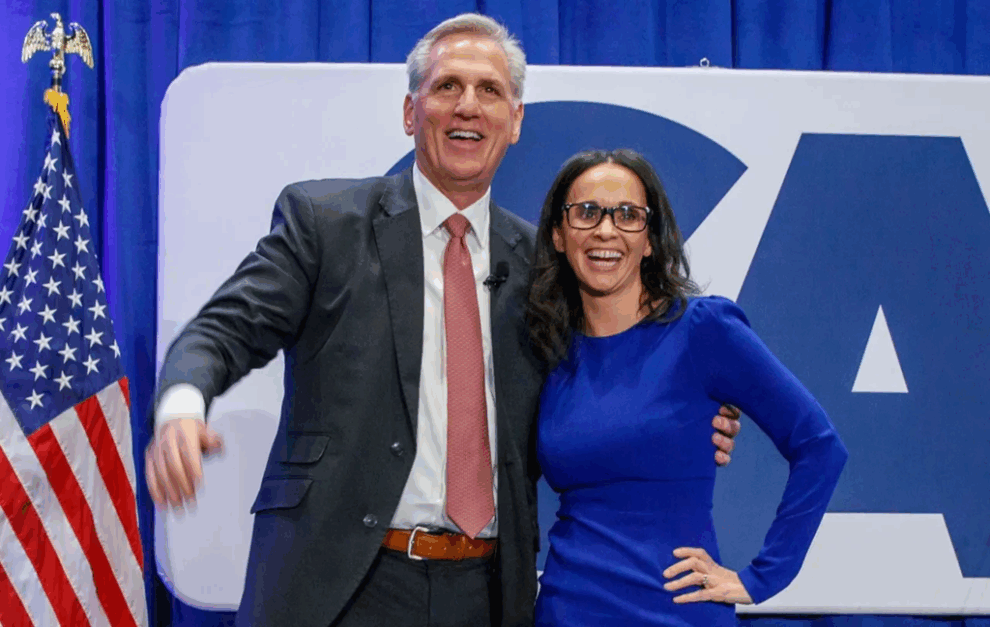It’s a familiar story: Republicans suffer a dramatic defeat on a major statewide ballot initiative while the perennial consultants collected six-figure sums for shoddy work.
Though Virginia, New York, and other states had a host of high profile elections this week, all eyes were on California to see what would come out of the battle over Proposition 50. Democrats, the architects of the initiative itself, saw it as a path to cement their dominance over Republicans by circumventing the state’s existing Citizens Redistricting Commission (CRC) and imposing nakedly partisan maps that would politically snipe Republican incumbents. Republicans emphatically rejected the gambit from the onset. Going into yet another special election to decide the fate of a statewide ballot initiative, many GOP leaders wanted a more measured approach than what they had seen during the unsuccessful recall of Governor Gavin Newsom in 2021—something that might appeal to independent and moderate voters wary of partisan trench warfare.
They also wanted to avoid another money pit, the kind of consultant-driven operation that had come to define the state party’s failures under Jessica Millan Patterson. But that wasn’t how things played out.
When Rep. Kevin McCarthy and Patterson muscled their way into control of the “No on Prop 50” campaign, any serious chance of beating back a Democratic power grab seems to have subsided rather quickly. Astute Republicans could see the writing on the wall—because they’ve been there many times. The same small circle of insiders, who always seem to find their way to the trough, would find a way to enrich themselves once more. And so support dried up.
In August, McCarthy boasted that he intended to raise $100 million to fight Prop 50. One month later, the amount he had actually raised was closer to $7 million. The same enthusiasm that enabled Republicans to raise $45.3 million in 2021 to support Newsom’s recall was, evidently, not there for McCarthy and Patterson in 2025.
Fortunately for them, philanthropist Charles Munger Jr. invested upwards of $30 million of his own money to fight Prop 50. Unfortunately for Munger, his money wasn’t in good hands.
Munger runs a political action committee called Protect Voters First PAC. That PAC bankrolled No on Prop 50 ads, the rollout of which was managed by the consulting firm Swing Strategies, run by Tom Ross. Ross describes himself as “a seasoned political strategist and public relations expert who has spent over three decades shaping California’s future.” While a full list of the statewide ballot propositions he has worked on is not shown on the site, Ross boasts a 91% win rate.
Time to update those numbers.
A source close to the campaign told SoCal Daily Pulse that Jessica Patterson personally steered the media contracts to Swing Strategies. As part of the arrangement, she allegedly negotiated a cut of 1 percent of the total ad buy spend for herself. Based on reports from CalAccess, Swing Strategies (which appears as Meridian Pacific Inc. DBA Swing Strategies) received roughly $31 million from the No on 50 committee titled “Protect Voters First, Sponsored by Hold Politicians Accountable,” which is Munger’s pot of money. Just by that math, Patterson allegedly stood to make around $310,000.
And that’s before counting what she earned as the head of McCarthy’s PAC.
Unlike a PAC, Swing Strategies is a private company and therefore not required to disclose who they pay or how they distribute funds. That makes this sort of compensation nearly invisible to the public.
So the perennial GOP consultant class has secured another lucrative arrangement for themselves—as they often do. But one has to spend money to make money, as the adage goes. So, were the ads at least effective?
Even before the campaign’s fundraising troubles became public, donors were expressing frustration over the quality of the No on Prop 50 mailers. SFGate reported that some pieces misattributed quotes to well-known organizations. One mailer includes a misleading remark from Darius Kemp, the executive director of Common Cause, to make it seem as though Common Clause opposed Prop 50. They did not. And this forced them to clarify that they were “in no way affiliated with Protect Voters First and did not authorize this mailer.”
Not a great look. It’s also worth noting that direct mail was sent to households that had already voted.
“Today, after receiving nothing in my mailbox for two months about Prop 50, I received three mailers (same day) from the CA GOP telling me in dire terms that I needed to send my ballot to vote No on Prop 50,” one source told SoCal Daily Pulse prior to Election Day. “Stern, scolding messages like ‘don’t make excuses,’ that I’d better ‘do my part,’ etc. One mailer even says if I don’t vote, that my neighbors (all liberal Democrats) will find out that we ‘let them down…’ But if that’s true, then my advice: they could have asked my neighbors and would have learned that all my household members—wait for it—cast our ballots weeks ago!”
Even worse, some have reported receiving mail days after the election ended altogether. Assemblyman Carl DeMaio called it “more incompetence by the CAGOP” and reiterated his call for the new Party Chair Corrin Rankin to resign.
It’s impossible to determine the exact extent to which this problem was occurring, but wherever and whenever this takes place, it is an obvious waste of donor funds. Swing Strategies—who, as a reminder, received $31 million from Protect Voters First—calls their direct mail program “award-winning,” despite these obvious tactical blunders.
“With more than 20 years of political advertising experience, we know how to deliver the correct message to the right audience,” their website claims.
Despite that assertion, Politico felt it worthwhile to use their national platform to call the No on Prop 50 ads “defiantly old-fashioned” and lacking “any apparent effort to compete for voters’ mindshare in an attention economy.” Ouch.
To that point, the official Protect Voters First Facebook page has 17 followers. Throughout a special election cycle which Republican operatives argued was critically important, they posted only ten times, and not one single post garnered more than three likes. Their Twitter/X account fares no better.
This is an honest question with no hyperbole or attempt to be humorous: did they forget their accounts existed?
Did they seriously not think to use some of that $31 million to run a basic social media outreach campaign?
Where did all that money go?
Perhaps all these Republican consultants knew all along it could not seriously contend with Democrats, who raised $171.6 million towards supporting Prop 50 and have—by all metrics that matter—vastly superior organization and campaign infrastructure. That is a cynical take, perhaps, but if it’s the case, Republican donors will need to start keeping better tabs on who they’re entrusting with their dollars.
After all, if a conservative consulting firm in California is touts that they have been around for more than three decades—during which, Republicans have gone from holding the Governorship multiple times to being a legislative superminority in both the Assembly and Senate and a Party that has not won a single statewide office position since 2006—is that really something to brag about?
Indeed, many of the GOP leaders in California have extremely shaky track records—but it seems not to affect their ability to lead (and then lose) major campaigns on the Party’s behalf. Many would say this extends to Patterson, who was controversial throughout her six-year tenure as CAGOP Chairwoman. Yet somehow—“somehow” here meaning “with the backing of Kevin McCarthy”—she continues to land high-profile gigs, which rarely deliver the intended outcome for Republicans. Some might say she seems to fail ever upwards in perpetuity.
Maybe that’s because, as one CAGOP member told the California Globe, “she’s worked harder for Kevin McCarthy to be speaker than she has at her current job [as then-Chairwoman].”
“California’s GOP Legislative leadership and the CAGOP leadership are completely beholden to the ‘McCarthy Mafia’ and thus they have been able to keep everyone in line because they control the flow of money, to candidates and the infrastructure,” another CAGOP member said of Patterson’s reign. These remarks echo a common critique of Patterson—that she and McCarthy took vast sums of Republican money out of California to help elect Congressional candidates in other states.
Meanwhile, at home, Republican influence dramatically waned throughout the state and winnable local races were lost to more focused and more strategically-sound Democrats.
It’s always been like this. In 2008, Patterson served as the Victory Director in Nevada for the John McCain presidential campaign. That year, Nevada went for Barack Obama. Two years later, Patterson worked as Statewide Field Director in California for the Meg Whitman gubernatorial campaign. Despite Whitman putting $177 million of her own money on her campaign—a record at the time—her bid was short-lived. For the next seven years, Patterson helped found and run the California Trailblazers, a candidate‑recruitment and training organization, and became more deeply entrenched within the CAGOP. Of course, there is little in the way of visible evidence that this work produced a transformational shift in California Republican legislative prospects prior to 2019.
Nevertheless, she was seen as the best candidate for Chairwoman of the CAGOP. Upon election in 2019, Republican leadership was sure to let everyone know that they had just elected its first woman, first Latina, and first millennial to lead the Party. Surely, this would help Republicans reverse their fortunes and gain new ground with a rapidly changing electorate. The Los Angeles Times editorial board said at the time that Patterson’s “inclusive message is the only thing likely to stop the GOP’s free fall in this famously liberal state.”
Enthusiasm was high. So how’d she do?
The year prior to her tenure, the California State Senate held 14 Republican seats. 2018 was considered a slaughterhouse for Republicans, a “a direct result of ballot harvesting,” according to then-Chair of the Orange County Republican Party Fred Whitaker. That was the cycle where California changed its rules to permit the practice, and Democrats were far better and more quickly equipped to utilize it to ensure favorable electoral outcomes. This was pre-Patterson. Across her tenure, the number of sitting Republican Senators fell from 14 to 8. In the State Assembly, she started with 25. Today, there are 20.
Under her leadership as CAGOP Chairwoman, the 2021 special election to recall Newsom failed by more than 20 percentage points after repeatedly insisting it would succeed. And, of course, the No on Prop 50 effort also failed despite her involvement (and double-dipping on both the money she helped raise into Kevin McCarthy’s PAC and, allegedly, a cut of the $31 million from Protect Voters First). Though she is no longer Chair of the CAGOP, there’s no doubt she had a heavy hand in this initiative—and is receiving a hefty paycheck for it.
Somehow, we’ve come this far without breaking down the actual numbers for the vote on Prop 50. Though there are votes yet uncounted, the current tally stands at 63.9% supporting and 34.1% opposing. If those numbers hold, it’s possible that Prop 50 will fail by an even larger margin than the 2021 recall.
“While tonight’s results are disappointing, we left everything on the field fighting to stop Gavin Newsom and Sacramento politicians’ partisan power grab,” Patterson said in a statement posted to Twitter/X. “Though this isn’t the outcome we hoped for, we’re proud to have stood for fair maps and honest representation for all Californians.”
“Jessica, I mean this with all due respect, your campaign was awful and almost nonexistent,” writes Twitter/X user Kyle Raccio. “I don’t know what you were doing but it was a colossal failure and a lot of people were let down.”
A reporter for SoCal Daily Pulse reached out to Patterson for comments and received no response.
In spite of a crushing defeat the “No” gang have already made out like bandits and set off into the proverbial sunset. A source who asked to remain anonymous told SoCal Daily Pulse that Patterson herself has already collected $250,000, with another $250,000 reportedly on the way, bringing her total haul to nearly half a million dollars. But she’s not alone. Bryan Watkins of Irvine-based Inversion Strategies, tasked with coalition outreach, received $150,000 for his work. And Andy Gharakhani, who last year managed Steve Garvey’s failed Senate campaign and led the fundraising for No on Prop 50, pocketed $100,000.
One cannot help but wonder if mid-level Republican donors would have liked to know that information prior to making a contribution. They already face the Herculean effort of combatting the Democrats’ political machine—which virtually always leverages superior mechanics, money, momentum, and messaging—and gaining enough ground in Sacramento to break the supermajority without the usual suspects cutting in to lining their coffers, put out extremely shoddy work, and somehow retain the business.
Perhaps it’s time the party of free markets and healthy competition considered shopping around for new consultants.
















Add Comment